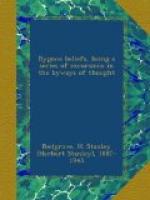of the Holy Powers denotes a certain courageous and
unflinching virility . . . vigorously conducted to
the Divine imitation, not forsaking the Godlike movement
through its own unmanliness, but unflinchingly looking
to the super-essential and powerful-making power,
and becoming a powerlike image of this, as far as
is attainable....The appellation of the Holy Authorities
... denotes the beautiful and unconfused good order,
with regard to Divine receptions, and the discipline
of the super-mundane and intellectual authority .
. . conducted indomitably, with good order towards
Divine things.... [And the appellation] of the Heavenly
Principalities manifests their princely and leading
function, after the Divine example...."[1] There is
a certain grandeur in these views, and if we may be
permitted to understand by the orders of the hierarchy,
“discrete” degrees (to use SWEDENBORG’S
term) of spiritual reality—stages in spiritual
involution,—we may see in them a certain
truth as well. As I said, all virtue, power,
and knowledge which man has from God was believed
to descend to him by way of these angelical hierarchies,
step by step; and thus it was thought that those of
the lowest hierarchy alone were sent from heaven to
man. It was such beings that white magic pretended
to evoke. But the practical occultists, when
they did not make them altogether fatuous, attributed
to these angels characters not distinguishable from
those of the devils. The description of the
angels in the Heptemeron, or Magical Elements,[2]
falsely attributed to PETER DE ABANO (1250-1316),
may be taken as fairly characteristic. Of MICHAEL
and the other spirits of Sunday he writes: “Their
nature is to procure Gold, Gemmes, Carbuncles, Riches;
to cause one to obtain favour and benevolence; to
dissolve the enmities of men; to raise men to honors;
to carry or take away infirmities.” Of
GABRIEL and the other spirits of Monday, he says:
“Their nature is to give silver; to convey things
from place to place; to make horses swift, and to
disclose the secrets of persons both present and future.”
Of SAMAEL and the other spirits of Tuesday he says:
“Their nature is to cause wars, mortality, death
and combustions; and to give two thousand Souldiers
at a time; to bring death, infirmities or health,”
and so on for RAPHAEL, SACHIEL, ANAEL, CASSIEL, and
their colleagues.[1b]
[1] On the Heavenly Hierarchy. See the Rev. JOHN PARKER’S translation of The Works of DIONYSIUS the Areopagite, vol. ii. (1889), pp. 24, 25, 31, 32, and 36.
[2] The book, which first saw the light three centuries after its alleged author’s death, was translated into English by ROBERT TURNER, and published in 1655 in a volume containing the spurious Fourth Book of Occult Philosophy, attributed to CORNELIUS AGRIPPA, and other magical works. It is from this edition that I quote.
[1b] Op. cit., pp. 90, 92, and 94.




